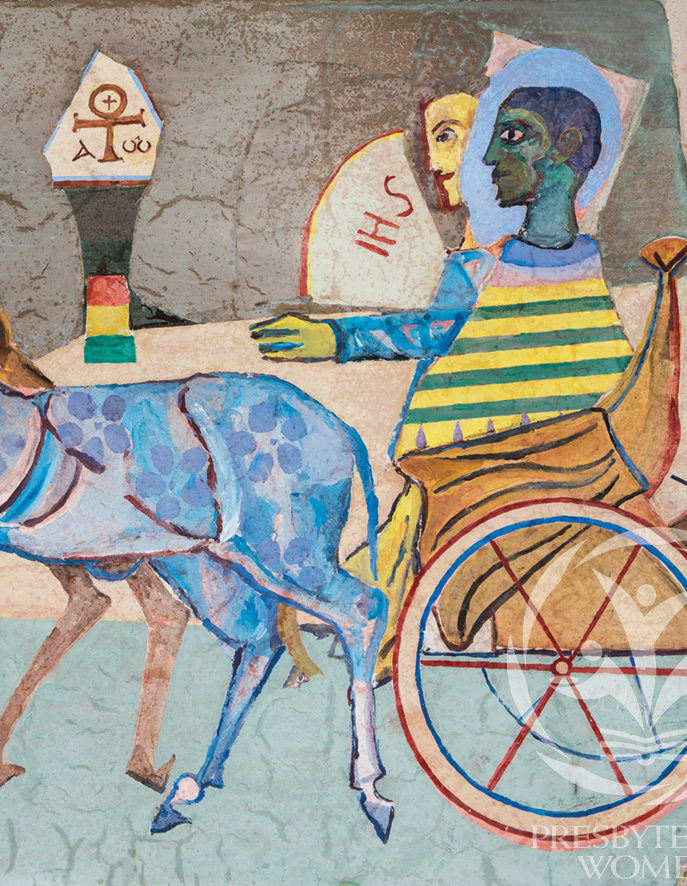Sacred Encounters Lesson Seven

Lesson Seven: An Ethiopian Eunuch Encounters the Good News of Jesus Christ
Scripture: Acts 8:26–40
The Word of God is an essential tool for expanding the reign of God.
“We all know the history of the Jews in Egypt and that Joseph and Mary fled there to avoid the wrath of Herod. Most of us also know about the “Ethiopian Eunuch” in Acts 8:27 who was “a court official of the Candace, queen of the Ethiopians,” and baptized by Philip on his way back to Africa,” writes Rowland Van Es, Jr., educator at St Paul’s University in Limuru, Kenya.
The following text is adapted from Van Es’s article, “Africa: In the Bible, in Christianity’s Roots and Branches.” The citation and link to the article are below.
But there are so many other references to Africa in the Bible. In fact, Africa is mentioned over 1,000 times in the Old Testament. Seven hundred and forty references are to Egypt. There are also many references to Cush. While there is some debate over exactly where it was, it generally refers to the areas south of Egypt, up the Nile into modern day Sudan.
Abraham and Sarah’s slave Hagar came from Cush, but not all Cushites were slaves. At one time Cush ruled over Egypt. When Moses took a Cushite wife, it made his sister Miriam jealous, possibly because he was marrying “up.” Remember the beloved in the Song of Songs is described as “black and beautiful” (1:5). The famous queen of Sheba (1 Kings 10) was also from Africa (probably Ethiopia).
Several people in the New Testament were also born in Africa. According to tradition, John Mark, author of Mark, was born in Cyrene, in present day Libya. As was Simon who carried Jesus’ cross, and Lucius mentioned in Acts 13:1 with Simeon, “who was called Niger,” a country in western Africa.
Much of early church history and many of our first great Christian theologians were born in and worked in Africa. Cyprian and Tertullian both came from Carthage (in modern day Tunisia); Clement, Origen, Athanasius, and Cyril were all born in or did most of their work in Alexandria, Egypt.
Augustine of Hippo was born in what is now part of Algeria. And in the category, “more church history I didn’t know,” three of the early popes were from Africa: Victor I; Melchaides or Meltiades; and Gelasius I.
And while much of early Christianity died out in North Africa, there is a long history of Coptic Christianity in Egypt and Sudan, and of Orthodox Christianity in Ethiopia. These churches all flourished and grew long before any Western missionaries came to Africa. Then came the astonishing spread of Christianity in Sub-Saharan Africa from the modern missionary era. But much of the work was carried out by local evangelists, helpers and translators. These first converts living out their faith attracted many others.
Today most Africans living south of the Sahara are Christians. It is projected Africa will have 760 million Christians by 2025. There are hundreds of African-instituted churches as well as those originally started by missionaries. There are a great many vibrant African churches with passionate followers. Africa is the new center of Christianity.*
*Rowland, Van Es, Jr. “Africa: In the Bible, in Christianity’s Roots and Branches” (Reformed Journal, February 8, 2023), blog.reformedjournal.com/2023/02/08/africa-in-the-bible-in-christianitys-roots-and-branches.
************
This blog is the seventh in a series of nine blogs.
Presbyterian Women in the PC(USA), Inc. publishes an annual Bible study. Sacred Encounters is the study for this year. You can purchase a Sacred Encounters Bible study book (HZN23100) and study along with us. Call 800/533-4371 or order online.
